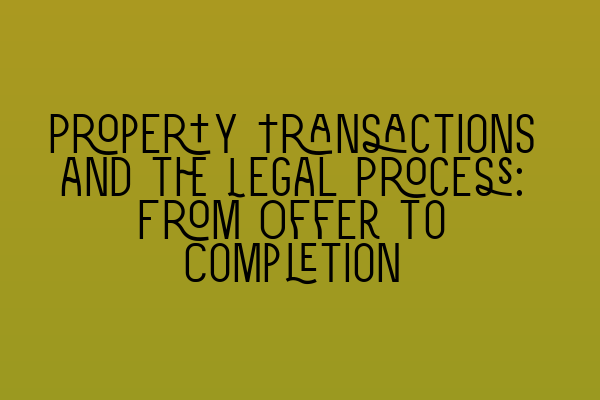[Title: Property Transactions and the Legal Process: From Offer to Completion]
Introduction: Understanding the Legal Process of Property Transactions
Property transactions can be complex and involve various legal processes that need to be followed. As a solicitor at SQE Property Law & Land Law, we believe it is essential for both buyers and sellers to have a clear understanding of the legal steps involved in a property transaction. This blog post will provide you with a comprehensive guide, from the initial offer stage to the completion of the transaction. By the end, you will have a better grasp of the legal process and be better prepared for your property transaction.
Before we dive into the details, please make sure to check out our related articles for more insights into property law:
1. [Updates in UK Property Laws: Key Changes and Implications]
2. [Legal Challenges in Property Transactions: A Comprehensive Guide]
3. [Navigating Lease Laws in the UK: Essential Guidelines for Tenants and Landlords]
4. [Dominate Property Law Questions: Avoiding Common Pitfalls]
5. [Land Law Revision Tips: Ace Your Exam Preparation]
Now, let’s get started!
1. Initial Offer: Making and Accepting an Offer
The first stage of a property transaction is when a buyer makes an offer to purchase a property. The offer is generally made through the buyer’s solicitor, who communicates the terms and conditions of the offer to the seller’s solicitor. This stage involves negotiations between the parties to reach an agreement on the price and conditions of the sale.
Once the seller accepts the offer, it becomes legally binding, and both parties move forward to the next step.
2. Conveyancing: The Role of Solicitors
Conveyancing is a critical step in the property transaction process. It involves the transfer of legal ownership from the seller to the buyer. The solicitors on both sides play a vital role in ensuring a smooth transaction.
During conveyancing, the buyer’s solicitor will carry out various searches, such as local authority searches, environmental searches, and water and drainage searches, to uncover any potential issues that may affect the property. These searches help identify any planning or legal restrictions or potential problems that the buyer should be aware of.
Furthermore, the seller’s solicitor will compile all relevant legal documents, such as the title deeds, contracts, and property information forms, to provide to the buyer’s solicitor for review. This stage also involves the negotiation of contract terms and conditions between the solicitors.
3. Surveys and Mortgage Applications
Before proceeding with the purchase, it is crucial for the buyer to conduct surveys to assess the condition of the property. These surveys can include a basic valuation survey, a homebuyer’s report, or even a full structural survey.
Simultaneously, if the buyer requires a mortgage to finance the purchase, they will need to make a mortgage application. The lender will conduct a valuation survey to ensure the property’s value is in line with the loan amount being requested.
4. Exchange of Contracts: Binding Agreement
Once all parties are satisfied with the property’s condition and the mortgage application is approved, the next step is to exchange contracts. This is a significant milestone in the property transaction process, as it creates a legally binding agreement between the buyer and the seller.
During the exchange of contracts, both parties, along with their solicitors, will sign identical copies of the contracts. The completion date will be agreed upon, and a deposit, usually 10% of the purchase price, is payable by the buyer.
5. Completion: Finalizing the Transaction
Completion is the final stage of the property transaction process. On the agreed completion date, the buyer’s solicitor transfers the remaining funds to the seller’s solicitor. Upon receipt of the funds, the seller’s solicitor will confirm that the transaction is complete and provide the keys to the buyer.
After completion, the buyer’s solicitor will proceed with post-completion matters, including registering the property with the Land Registry and ensuring all necessary legal documents are retained.
Conclusion: Navigating the Legal Process of Property Transactions
Congratulations! You have now gained a comprehensive understanding of the legal process involved in property transactions. From making an offer to completing the transaction, each step plays a vital role in ensuring a smooth and successful process.
While this blog post provides a general overview, it is crucial to seek the guidance of a qualified solicitor to navigate the complexities of property law. SQE Property Law & Land Law is here to assist you throughout your property transaction journey.
Don’t forget to check out our related articles for further insights into property law:
1. [Updates in UK Property Laws: Key Changes and Implications]
2. [Legal Challenges in Property Transactions: A Comprehensive Guide]
3. [Navigating Lease Laws in the UK: Essential Guidelines for Tenants and Landlords]
4. [Dominate Property Law Questions: Avoiding Common Pitfalls]
5. [Land Law Revision Tips: Ace Your Exam Preparation]
If you have any questions or require legal guidance, please don’t hesitate to contact us. We are here to ensure a smooth and successful property transaction for you.
